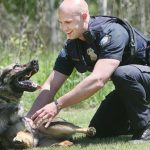Power Of Therapy Dogs
July 22, 2020

With the COVID-19 restrictions on visits to nursing home, schools, libraries, hospitals, first responders, etc., the programs for them have been greatly curtailed. Hopefully, once these institutions are allowed to reopen then highly successful programs can be reinstituted.
Why does a normally silent elderly resident now converse with the nursing home staff? What makes a patient smile during a chemotherapy treatment? How can a timid student read calmly in front of classmates? What calms an agitated psychiatric patient? How can an exhausted first responder decompress after an emotionally-draining search and recovery mission? The common thread between these different scenarios is the calming presence of therapy dogs.
Therapy dogs have made a difference in the lives of nursing home and hospice residents, patients in hospital settings, children and adults with disabilities, and people in need of an emotional release from stress. These remarkable dogs sense people’s needs during visitations made by volunteer dog and handler teams. Interaction with therapy dogs provides tactile, visual, auditory and emotional stimulation.
The dogs also stimulate communication that may begin with a person saying “hi” when greeting the dog, to reminiscing with the handler about a beloved dog that graced their life, and eventually conversing with other people within their environment. Regularly scheduled therapy dog visits stimulate anticipation, excitement and feelings of optimism. The use of dogs to help people is not a new concept. Florence Nightingale pioneered the idea of animal assisted therapy and discovered that patients of different ages living in a psychiatric institution were relieved from anxiety when they spent time with small animals. Sigmund Freud believed that dogs could sense certain levels of tension by his patients and used his dog to communicate with his patients. He felt that if his patients were more comfortable talking to his dog first, that later they would feel more comfortable talking to him.
The therapy dog movement has spread rapidly throughout the U.S. and the world. Several organizations have been formed that evaluate, train, regulate and register therapy dog and handler teams serving in a variety of settings. National organizations like Pet Partners (formerly known as the Delta Society) and Therapy Dogs International have regional chapters throughout the country. At the more local level, Pets on Wheels has a Maryland chapter.
These organizations have similar requirements for therapy dog candidates: be calm and social with strangers; be able to adjust to loud noises and fast movements and are comfortable with other dogs because several therapy dogs may be present during visitations at the same facilities; be at least 1 year old; have lived with the owner for at least six months; can consistently perform basic obedience skills; remain calm when being handled (petted, grabbed, hugged, etc.) by different people; and tolerate the sights, smells, sounds and equipment found in nursing home and hospital settings (like wheelchairs, walkers, IV poles, etc.). Some organizations use the American Kennel Club’s Canine Good Citizenship Test to evaluate potential therapy dog candidates.
In addition, a health certificate must be completed annually by a veterinarian to confirm the dog has all current inoculations, is healthy and free of internal and external parasites. This is required for insurance coverage from therapy dog organizations. The organizations will have lists of facilities seeking dog and handler teams for visitations and may require documented monthly visits. Usually ID cards for handlers and tags worn by the dogs (issued by the therapy dog organization) must be worn during every visitation. Dogs must be bathed prior to all visitations because they may be interacting with people who have weakened immune systems.
The settings for therapy dog and handler team visitations are varied. Because dogs don’t criticize oral reading errors, some schools and libraries welcome “reader” dogs to help children develop confidence with their reading skills. Other therapy dogs have been visiting colleges and universities to help reduce stress for students facing their final exams.
Nursing homes can be lonely for residents because relatives don’t come to visit regularly, but when the volunteer therapy dog-handler teams visit, the Pets on Wheels slogan “Help lick loneliness” becomes a reality. Some hospitals and assisted living centers permit dogs to curl up or stretch out on the beds of patients to provide warmth, comfort, company and smiles. Some therapy dogs provide entertainment by demonstrating tricks and obedience skills or wearing costumes for different holidays or occasions like sporting events.
Immediately after Sept. 11, 2001, therapy dog teams assembled from all over the U.S. to provide comfort to the survivors, their families and first responders. This has resulted in the development of therapy dog programs that specialize in comforting victims and first responders following disasters.
The American Kennel Club issues therapy dog titles to purebreds and mixed breeds that are: certified/registered by an AKC recognized therapy dog organization; perform a minimum of 50 visits; and are registered with the AKC (for purebred dogs). Unregistered purebred dogs are registered with the AKC’s Purebred Alternative Listing Program, and mixed breeds are registered with the AKC’s Canine Partners Program.
If you think your dog has the “right stuff” and you are willing to volunteer your time to bring quality into the lives of others, consider enrolling into a therapy dog training program. The intrinsic reward of sharing your dog’s healing powers could be priceless.













